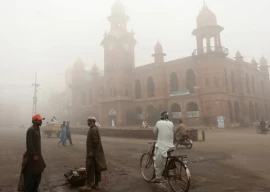
Sex tends to be a subject that remains off the table for open and honest discussion in Pakistani society, one of the reasons why there are so many misconceptions about it, especially among the youth.
On World Contraception Day (WCD), 2010, let us address the major concerns that precede and follow sexual intercourse. WCD is a worldwide campaign with a vision for a world where every pregnancy is wanted and a mission to improve awareness of contraception to enable young people to make informed decisions on sexual and reproductive health. The motto for this year’s campaign is ‘Contraception: It’s Your Life, It’s Your Responsibility’. The focus is on the need to encourage young people to take responsibility for contraception to prevent an unplanned pregnancy or sexually transmitted infection (STI). Given the social taboos and cultural influences in Pakistan, it is often hard for young people to learn about sex, especially safe sex. Most high schools do not address the issue at all. “What people tend to overlook is that despite cultural constraints, young boys and girls are curious about sex. Whatever we may like to think, some of them are having sex at a very early age,” said a private school teacher in Defence.
“I’ve already had sex,” said Sadia, a 15-year-old student. She said she had known little about safe sex at the time. “My partner and I did use a condom. Initially, he couldn’t find one but eventually he stole one of his father’s.” She said she got most of her information about protective measures off the internet. “Most of what I know about sex has been compiled off chapters on reproduction in my biology book, snippets on cable television and conversations with my friends,” says 13-year-old Junaid, adding that most of his friends download pornography to ‘learn’ about sex.
“Safe sex or contraceptives are not even mentioned. It isn’t a subject that is discussed… I certainly can’t talk to my parents about it. If and when I actually have sex I don’t really know where to go to get condoms,” said 16-year-old Saad. He added that one of his friends who recently had sex with a girlfriend had procured a condom from another friend who stole one from his father. Most urban youth do not even know where condoms are available and they are hesitant to approach a Family Planning office to ask for one. “Do you even get condoms at convenience stores? I’ve gone to dozens and I can never see them on any shelf or counter. I don’t want to ask for them because I will get judged for it… I am obviously too young to go to a Family Planning Centre… It is much easier for the girl in this situation. She doesn’t have to worry about any of this.”
More young girls are sexually active in large cities today. Sadly, most of them are also ignorant about safe sex. “I know about condoms and the pill but it is hard to broach the subject, especially if one is unmarried,” said a 21-year-old LUMS student Rehana. She said Sabz Sitara, Chaabi and other Family Planning services cater only to married couples. “A couple of my single friends actually went to a health worker at a Family Planning Centre in Lahore. The first question they were asked was whether they were married,” she said. “They both pretended that they were and were grateful they didn’t have to produce their ID cards. They did get lots of detailed advice on using the pill and some free condoms but most of us are completely dependent on our partner to practice safe sex,” she said.
Extramarital sex is illegal in Pakistan. But this doesn’t mean it doesn’t take place throughout the country every single day.
“There are marked differences among the people we are helping. In the case of lower middle class and rural families the onus for birth control is on the woman. She is the one tired of constantly getting pregnant. The men generally don’t use condoms, even after they accept them with a smile and agree to everything we say,” said Family Planning worker Nighat at the Chaabi centre in RA Bazaar. “On the other hand, the men from upper middle class families and college students who want to take precautions against unwanted pregnancy are reluctant to come here and get help because many of them are unmarried,” she said.
Another lady health worker, Maheen, who also volunteers in rural areas said “I have accepted that it is my job to help people have safe sex, whether in marriage or outside it. It is naïve to assume that all the people having sex are married. The fact of the matter is, the numbers are getting larger and the people are getting younger… I tell myself, if young and unmarried people are going to have sex then they should at least be having safe sex. This isn’t official policy and many people take a very hard line on the issue but I figure restricting condoms and other contraceptives to only married couples still doesn’t stop the unmarried ones from having sex. It just makes it more likely that they will get pregnant or contract a disease.”
In a country where most parents never think of having ‘the birds and the bees’ talk with their teenage children and the social taboos surrounding the subject are extreme, young people curious about sex are forced to explore avenues like the internet and films to piece together information. This means that both the information and the impression these people have of sex are skewed, incomplete and more often than not entirely unrealistic.
“Most of what I know about safe sex comes from the fact that in nearly every teenage film some girl gets pregnant and then someone says ‘Why didn’t you use a condom’. That’s it. I don’t have any clue about where I would go to get one when I want to have sex,” said 15-year-old Hassan.
* Names have been changed to protect privacy
Published in The Express Tribune, September 26th, 2010.
1729662874-0/One-Direction-(1)1729662874-0-405x300.webp)


1722421515-0/BeFunky-collage-(19)1722421515-0-165x106.webp)

1726722687-0/Express-Tribune-Web-(9)1726722687-0-270x192.webp)


1732011525-0/Express-Tribune-(8)1732011525-0-270x192.webp)








COMMENTS (2)
Comments are moderated and generally will be posted if they are on-topic and not abusive.
For more information, please see our Comments FAQ